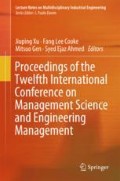Abstract
Knowledge division usually has positive effects on enterprises in enhancing their competitiveness, promoting knowledge innovation and reducing the management costs. This paper mainly studies the knowledge division within knowledge networks based on the cooperative game theory. The conclusions are drawn that: there is a positive correlation between the degree of knowledge division and the reward coefficient for the division of knowledge, the punishment for speculation, and the trust degree between division subjects, while there is a negative correlation between the degree of knowledge division and the knowledge distance.
Access this chapter
Tax calculation will be finalised at checkout
Purchases are for personal use only
References
Jr JN, Jr NR, Briggs R (2001) A framework for collaboration and knowledge management. In: Hawaii international conference on system sciences, p 1060
Inkpen AC, Tsang EWK (2005) Social capital, networks, and knowledge transfer. Acad Manag Rev 30(1):146–165
Sohn-Rethel A (1978) Economics and knowledge. Macmillan Education UK
Becker GS, Murphy KM (1992) The division of labor, coordination costs, and knowledge. Q J Econ 107(4):1137–1160
Loasby BJ (1999) The significance of penrose’s theory for the development of economics. In: Contributions to political economy, vol 18, issue 1, pp 31–45
Rui MJ (2006) Knowledge division and creation in module network industrial chain. Contemp Financ Econ 4:16 (in Chinese)
Yu W, Gu X, Wan J (2016) Mechanism of knowledge division and synergy in open innovation: knowledge flow perspective. Forum Sci Technol China 02:98–104 (in Chinese)
Ou-Ge QI, Zhao Y, Wang MC (2012) Beyond the micro-mechanism of urban agglomeration economies: from the division of labor to division of knowledge. China Ind Econ 1:36–45 (in Chinese)
Sun Q (2016) A dilemma between scientization and democratization of decision making and its solution: An analysis based on the knowledge division of the expert and citizen. J Cent South Univ (Soc Sci Edn) 22(6):149–155 (in Chinese)
Li Y (2017) Knowledge innovation, extended division of labor and social expanded reproduction. Frontiers 2:62–67 (in Chinese)
Yu W, Gu X, Xiong W (2017) Research on knowledge division and knowledge synergy of industry-university-research institute collaboration. Stud Sci Sci 35(5):737–745 (in Chinese)
Zhu F (2017) Re-understand the concept of cooperative game: connotation and rational basis. Soc Sci J 2:90–99 (in Chinese)
Lumineau F (2014) How contracts influence trust and distrust, vol 43, issue 5. Social Science Electronic Publishing, pp 1553–1577
Xu B (2014) Research on the mechanism of employee trust on knowledge integration and willingness to share. PhD thesis, Zhejiang University
Jin H (2014) The effects of intrinsic\(/\)extrinsic motivations and knowledge characteristics on knowledge-sharing intension. R & D Manag 26(3):74–85
Yang Z, Chen S (2008) Study on the knowledge sharing influence mechanism of the knowledge team-based on the analysis of trust and knowledge distance. J Southwest Jiaotong Univ 9(6):11–15 (in Chinese)
Bapna R, Gupta A et al (2017) Trust and the strength of ties in online social networks: an exploratory field experiment. MIS Q: Manag Inform Syst 41(1):115–130
Dayan R, Heisig P, Matos F (2017) Knowledge management as a factor for the formulation and implementation of organization strategy. J Knowl Manag 21(2):308–329
Hu Y, Gu X, Cheng Q (2015) An empirical study of the mechanism of the knowledge chain synergies. Stud Sci Sci 21(2):585–594 (in Chinese)
Acknowledgements
This work was partially supported by grants from the National Natural Science Foundation of China (Nos. 71602012), Sichuan Soft Science Project (Nos. 2018ZR0119), Chengdu Soft Science Project (Nos. 2016-RK00-00247-ZF), and Sichuan University (Nos. skqy201760s).
Author information
Authors and Affiliations
Corresponding author
Editor information
Editors and Affiliations
Rights and permissions
Copyright information
© 2019 Springer International Publishing AG, part of Springer Nature
About this paper
Cite this paper
Long, Y., Wei, Q., Wang, T., Fu, J. (2019). On Knowledge Division Within Knowledge Networks: The Perspective of Cooperative Game Theory. In: Xu, J., Cooke, F., Gen, M., Ahmed, S. (eds) Proceedings of the Twelfth International Conference on Management Science and Engineering Management. ICMSEM 2018. Lecture Notes on Multidisciplinary Industrial Engineering. Springer, Cham. https://doi.org/10.1007/978-3-319-93351-1_10
Download citation
DOI: https://doi.org/10.1007/978-3-319-93351-1_10
Published:
Publisher Name: Springer, Cham
Print ISBN: 978-3-319-93350-4
Online ISBN: 978-3-319-93351-1
eBook Packages: Intelligent Technologies and RoboticsIntelligent Technologies and Robotics (R0)

